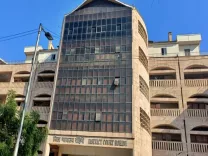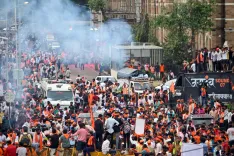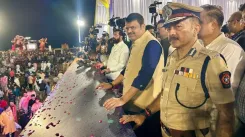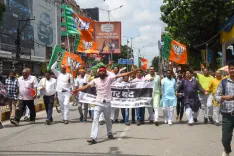Why Are OBCs Protesting Against Maratha Reservation Under Their Quota?
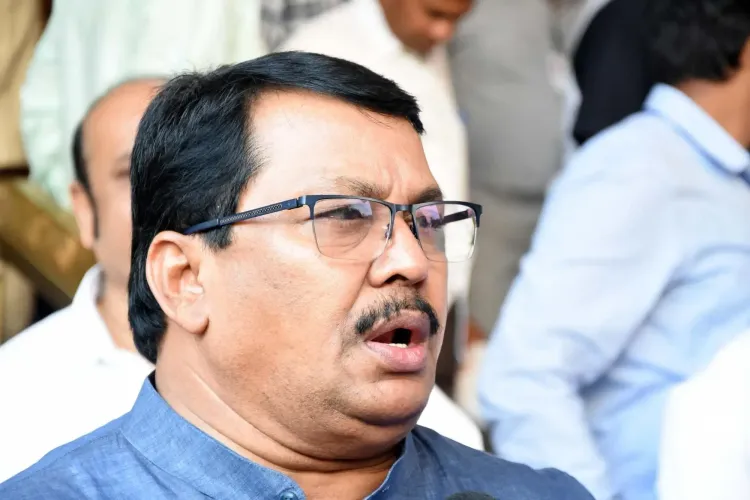
Synopsis
Key Takeaways
- OBC organizations are uniting against Maratha reservation.
- Protest march scheduled for October in Nagpur.
- Concerns about dilution of OBC quota benefits.
- Key leaders are actively opposing the government's decision.
- Legal and grassroots strategies planned for the fight.
Nagpur, Sep 6 (NationPress) OBC organizations have collectively decided to organize a protest march in Nagpur this October against the Maharashtra government's decision to implement the Hyderabad Gazette, which grants Kunbi status to the Maratha community. This move allows them to access benefits under the OBC quota.
Representatives from OBC groups across Nagpur, Bhandara, Gondia, Gadchiroli, Chandrapur, Wardha, Yavatmal, Amravati, Akola, Buldhana, and Washim districts of Vidarbha convened on Saturday, expressing that the government resolution would unjustly affect the OBC community.
A prominent OBC leader, Vijay Wadettiwar, who is also a member of the Congress Legislature Party, stated that the government had initially included the term 'eligible' in the draft resolution regarding the issuance of Kunbi certificates, which would allow the Maratha community to receive reservation benefits under the OBC category.
“However, when the final government resolution was released, the term 'eligible' was omitted. This indicates that the Maratha community will indeed receive reservations under the OBC quota, which is an injustice to the original OBC community. To oppose this, a committee of 25 notable individuals will be established, and a significant OBC march is set for Nagpur in October,” he remarked.
Wadettiwar noted that during Saturday's meeting, leaders from various OBC organizations voiced their strong opposition to extending reservation benefits to the Maratha community under the OBC quota.
The meeting was attended by Congress legislator Abhijit Vanjari, former MP Khushal Bopche, Shekhar Savarbandhe, Nagesh Chaudhary, Ishwar Balbudhe, Dnyanesh Vakudkar, Adv Kishore Lambat, and Umesh Korram from the OBC Yuva Adhikar Manch, among others.
“The government’s action concerning Maratha reservations will certainly be detrimental to OBCs. Currently, 13 percent has already been allocated from the 27 percent reservation. If the remaining 19 percent is also dedicated to the Maratha community, how much will be available for OBCs? There’s a risk that OBC rights may vanish,” Wadettiwar explained.
He called on other OBC organizations and individuals to join their cause, irrespective of political affiliations.
He further criticized the Rashtriya Swayamsevak Sangh (RSS) for its stance against reservations, claiming that those aligned with this ideology are currently in power.
“How can we expect them to refrain from undermining OBC reservations? If we fail to engage in legal battles now, the OBCs will face significant repercussions,” he stated.
Wadettiwar accused the RSS and its supporters in the state government of conspiring to eliminate political reservations for OBCs.
“A conference of leading OBC figures will be convened in Nagpur on September 12 to devise strategies for contesting the government’s decision regarding Maratha reservations,” he said.
Wadettiwar affirmed that their fight would occur on two fronts: judicial and grassroots activism, stating that the lawyers' association from Vidarbha will vigorously advocate for OBCs in court.
“The second aspect of our struggle will involve demonstrations. Our position is that no one should face injustice, and it is imperative to defend our rights. We stand firm that OBC reservations must remain intact,” he concluded.
Previously, senior OBC leader and NCP Minister, Chhagan Bhujbal, vehemently opposed the allocation of reservation benefits to the Maratha community under the OBC quota.
He pointed out that the term 'eligible' for Marathas to obtain Kunbi status was removed, and the final government resolution could lead to severe consequences.
He has also expressed intentions to approach the Supreme Court and High Court, asserting that Marathas should not be included in the OBC quota, as 17 percent reservation is already allocated to 374 communities in the state.
Minister Bhujbal, the founder of Mahatma Phule Samata Parishad, questioned the legality of assigning OBC status to Marathas, citing that the court has previously dismissed the notion of categorizing Marathas and Kunbis as a single community as “absurd.”
Meanwhile, Chief Minister Devendra Fadnavis reassured that as long as the MahaYuti government is in power, OBCs will not be subjected to injustice, affirming that the government does not intend to redistribute reservations from one community to another.
“Marathas will receive their rightful entitlements, and OBCs will receive theirs. We will not allow conflict between the two communities,” he emphasized.

